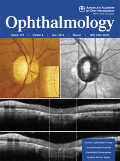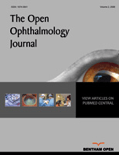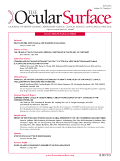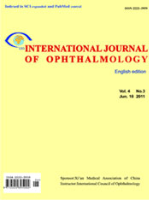
OPHTHALMOLOGY
Scope & Guideline
Illuminating the path to better vision and eye care.
Introduction
Aims and Scopes
- Neuro-Ophthalmology:
A significant focus on neuro-ophthalmological conditions, including optic neuropathies, visual disturbances secondary to neurological disorders, and the intersection of neurological and ophthalmological care. - Genetic and Rare Disorders:
Research on inherited optic neuropathies, genetic mutations associated with ocular conditions, and case studies highlighting rare disorders, reflecting an ongoing interest in the genetic basis of eye diseases. - Clinical Trials and Treatment Efficacy:
Studies evaluating the efficacy and safety of various treatment modalities, including pharmacological interventions and surgical procedures, particularly in the context of optic neuropathies and other complex ocular conditions. - Innovative Imaging Techniques:
Utilization of advanced imaging technologies, such as Optical Coherence Tomography (OCT) and Angiography, to enhance diagnostic precision and monitor disease progression in various ocular conditions. - Public Health and Epidemiology:
Exploration of population-based studies and public health issues related to ocular diseases, including the impact of systemic conditions on eye health and the epidemiology of ocular manifestations in infectious diseases. - Education and Awareness:
Efforts to improve patient education and awareness regarding ocular diseases, treatment options, and the importance of early detection and intervention.
Trending and Emerging
- Neuro-Ophthalmology and Visual Pathway Disorders:
An increase in research exploring the connections between neurological disorders and visual impairment, including the impact of conditions like multiple sclerosis and idiopathic intracranial hypertension on ocular health. - Impact of COVID-19 on Eye Health:
Rising interest in the ocular manifestations of COVID-19 and its long-term effects on eye health, including studies on post-viral optic neuropathy and other related conditions. - Novel Therapeutic Approaches:
Emerging themes around innovative treatments, including gene therapy and new pharmacological agents, particularly in the context of inherited optic neuropathies and degenerative diseases. - Artificial Intelligence and Digital Health:
Growing publications on the application of AI and machine learning in ocular diagnostics, imaging analysis, and patient management, reflecting a trend towards integrating technology in ophthalmology. - Patient-Centered Care and Quality of Life Assessments:
Increased focus on the quality of life impacts of ocular conditions, emphasizing the patient experience and outcomes, as well as the importance of holistic approaches to treatment.
Declining or Waning
- Traditional Surgical Techniques:
Decrease in publications related to conventional surgical approaches in favor of minimally invasive techniques and innovative procedures, indicating a shift towards more modern treatment modalities. - General Ophthalmology:
A reduction in studies focused on general ophthalmic conditions not related to neuro-ophthalmology. The journal appears to be concentrating more on specialized areas, particularly those intersecting with neurological conditions. - Systemic Disease Correlations:
Less emphasis on the broader systemic implications of ocular diseases, as the focus narrows to specific conditions and their direct ocular manifestations, particularly in the context of neuro-ophthalmology.
Similar Journals

Open Ophthalmology Journal
Exploring the frontiers of eye care and vision science.The Open Ophthalmology Journal, published by Bentham Science Publishers Ltd, is a vital resource in the field of ophthalmology, dedicated to advancing knowledge through open-access research. With an ISSN of 1874-3641, it offers a platform for the dissemination of innovative studies from 2011 to 2024, focusing on the latest developments in eye care and vision science. Despite being categorized in the lower quartile (Q4) according to the 2023 rankings, and holding a position in the Scopus Ricks at 113 out of 137 in the ophthalmology domain, the journal serves as a valuable outlet for emerging scholars and seasoned researchers alike to share their findings. The journal's commitment to accessibility ensures that its content is available to a broad audience, promoting collaboration and knowledge exchange. Located in the Netherlands, The Open Ophthalmology Journal aspires to become a cornerstone for those passionate about understanding and improving ocular health through rigorous scientific inquiry.

INTERNATIONAL OPHTHALMOLOGY
Connecting Innovators in Vision Health.International Ophthalmology is a prestigious journal published by Springer, dedicated to advancing the field of ophthalmology through the dissemination of high-quality research and clinical studies. With an ISSN of 0165-5701 and an E-ISSN of 1573-2630, this journal has been a vital resource since its inception in 1978, serving the global community of ophthalmologists, researchers, and healthcare professionals. The journal holds a significant Q2 ranking in the category of ophthalmology and has achieved a commendable position as #56 in Scopus's rankings, placing it within the top tier of its field. Although it does not offer open-access options, articles published in International Ophthalmology are widely cited and respected, playing a crucial role in the ongoing dialogue regarding contemporary ophthalmic practices and innovations. With a broad scope covering all aspects of eye care, this journal is essential for those aiming to keep abreast of the latest developments and research findings that shape the future of vision science and clinical practice.

JAPANESE JOURNAL OF OPHTHALMOLOGY
Leading the Charge in Ophthalmic DiscoveriesJapanese Journal of Ophthalmology, published by Springer Japan KK, is a premier peer-reviewed journal dedicated to advancing the field of ophthalmology. With an impressive impact reflected in its Q1 categories—ranking among the top journals in both Medicine (miscellaneous) and Ophthalmology, as per the 2023 metrics—it serves as an essential platform for researchers and professionals to disseminate their findings. Covering a broad spectrum of topics from clinical studies to innovative technologies in eye care, this journal not only supports the ongoing education of its readership but also fosters significant developments within the field. The journal, which has been in circulation since 1973 and is set to continue through 2024, offers access to vital research, thereby enabling practitioners and scholars to keep abreast of the latest advancements. Its distinguished Scopus ranking of #30 out of 137 in Medicine - Ophthalmology, placing it in the 78th percentile, further underscores its influence and importance in contributing to the global understanding of eye health.

Ocular Surface
Transforming Ophthalmic Research for a Brighter TomorrowOcular Surface, published by Elsevier, stands at the forefront of ophthalmology research, with a notable Impact Factor reflecting its significant contribution to the field. As a vibrant platform for disseminating cutting-edge findings, this journal has achieved Q1 ranking in the Ophthalmology category as of 2023, placing it amongst the top-tier journals globally, specifically ranking 4th out of 137 in Scopus with an impressive 97th percentile. Spanning across the years from 2003 to 2024, Ocular Surface focuses on advancing knowledge in areas such as ocular pathology, therapy, and surgical interventions. While the journal is not open access, it provides invaluable insights and empirical data essential for researchers, professionals, and students dedicated to improving ocular health. With an address rooted in Amsterdam, Netherlands, this esteemed journal continues to enrich the global conversation in ophthalmology.

Case Reports in Ophthalmological Medicine
Elevating Patient Care via Shared ExperiencesCase Reports in Ophthalmological Medicine, an esteemed journal published by HINDAWI LTD, is a vital resource for researchers and professionals in the field of ophthalmology. With an emphasis on the dissemination of novel case reports and innovative findings, this open-access journal has been providing accessibility to cutting-edge ophthalmological research since 2011, allowing for a broader exchange of knowledge among clinicians and academics. Although specific impact factor and h-index data are not detailed, the journal is committed to fostering a collaborative environment for the global ophthalmology community, promoting evidence-based practices through rigorously peer-reviewed articles. The journal's dedication to open access ensures that valuable insights reach a wider audience, facilitating advancements in patient care and surgical techniques. Case Reports in Ophthalmological Medicine stands as a pivotal platform for sharing diverse clinical experiences, contributing significantly to the enhancement of ophthalmology as a specialty.

Journal of Ophthalmic & Vision Research
Pioneering Insights in Vision ResearchThe Journal of Ophthalmic & Vision Research, published by KNOWLEDGE E, stands as a crucial platform for disseminating high-quality research in the field of ophthalmology. With an ISSN of 2008-2010 and an E-ISSN of 2008-322X, this journal fosters open access to valuable insights since 2010, enhancing visibility and reach for researchers globally. Based in Dubai, UAE, it has established a reputation for excellence, reflected in its Q2 ranking in Ophthalmology for 2023 and its position among the top 65th percentile in Scopus. Covering a broad spectrum of topics within ophthalmic science, the journal serves as a vital resource for professionals, researchers, and students by presenting original research, reviews, and case studies that drive innovation and collaboration within the community. As the journal continues to contribute to advancements in eye care and vision sciences, it invites scholars to explore, engage, and publish within its pages, thus enriching the global discourse on ophthalmic health.

Nepalese Journal of Ophthalmology
Connecting Knowledge and Practice in Eye CareNepalese Journal of Ophthalmology, established by the NEPAL OPHTHALMIC SOC, is a premier Open Access journal dedicated to advancing the field of ophthalmology. With its ISSN 2072-6805 and E-ISSN 2091-0320, the journal provides an important platform for sharing innovative research and clinical findings in eye health. Since its inception in 2009, the journal has aimed to disseminate high-quality research that addresses contemporary challenges in ophthalmic practices, thus supporting improved patient care and outcomes within Nepal and beyond. The journal has achieved notable recognition, evidenced by its Scopus rank of #267 out of 915 in the field of General Medicine, placing it within the 70th percentile. Researchers, professionals, and students will find valuable information in its comprehensive articles, which cater to a multidisciplinary audience interested in the latest developments in ophthalmology. Emphasizing accessibility, the journal ensures that all published content is freely available, fostering collaboration and knowledge sharing in the global medical community.

Translational Vision Science & Technology
Shaping the Future of Ophthalmology Through InnovationTranslational Vision Science & Technology is a premier open access journal dedicated to the advancement of the field of ophthalmology and biomedical engineering. Published by the Association for Research in Vision and Ophthalmology, Inc., this journal has established itself as a leading source of high-quality research since its inception in 2013, achieving a remarkable impact factor reflective of its influential contribution to the field. With an impressive ranking of #21 in Ophthalmology and #120 in Biomedical Engineering within the Scopus database, it sits within the prestigious Q1 quartile for both categories as of 2023, further validating its significance. The journal's scope encompasses a wide variety of topics focused on the intersection of ophthalmological science and technological innovation, welcoming contributions that promote the understanding and treatment of visual disorders. Available as an Open Access publication since 2016, it ensures that cutting-edge research is freely accessible to researchers, practitioners, and students worldwide, facilitating the rapid dissemination of knowledge essential for the advancement of vision science.

Asia-Pacific Journal of Ophthalmology
Illuminating the future of ophthalmology in the Asia-Pacific.Asia-Pacific Journal of Ophthalmology is a distinguished open access journal published by the Asia-Pacific Academy of Ophthalmology (APAO), specializing in the latest advancements and research in ophthalmology. Since its inception in 2013, this journal has established itself as a vital platform for disseminating innovative findings and clinical practices across the Asia-Pacific region and beyond. With an impressive Scopus ranking of #10 out of 137 in the field of Medicine (Ophthalmology), placing it in the 93rd percentile, it garners significant attention and respect within the academic community. Currently holding a Q1 categorization in both Medicine (miscellaneous) and Ophthalmology, the journal embraces a broad scope that encompasses clinical studies, experimental research, and reviews aimed at enhancing the understanding and management of eye health. Its open access model since 2019 ensures that all published works are freely accessible, promoting greater collaboration and knowledge sharing among researchers, clinicians, and students. Situated in the Netherlands with a prominent address in Hong Kong, the journal serves as an essential resource for anyone dedicated to the field of ophthalmology.

International Journal of Ophthalmology
Transforming Eye Health Through Open Access InsightsThe International Journal of Ophthalmology, with ISSN 2222-3959 and E-ISSN 2227-4898, is a premier open-access publication dedicated to advancing the field of ophthalmology. Published by IJO PRESS in China, this journal has been a valuable resource since its inception in 2005, providing a platform for groundbreaking research and clinical studies in ophthalmic science. With an impressive Q2 ranking in the 2023 Ophthalmology category and a Scopus rank of #65 out of 137, the journal consistently showcases high-quality articles that contribute significantly to the understanding and treatment of eye diseases. Since adopting an open-access model in 2010, it has expanded its reach, allowing researchers, professionals, and students worldwide to access vital knowledge in the field. The journal aims to bridge the gap between laboratory research and clinical practice, making it an essential resource for those committed to improving visual health and advancing ophthalmologic education and innovation.